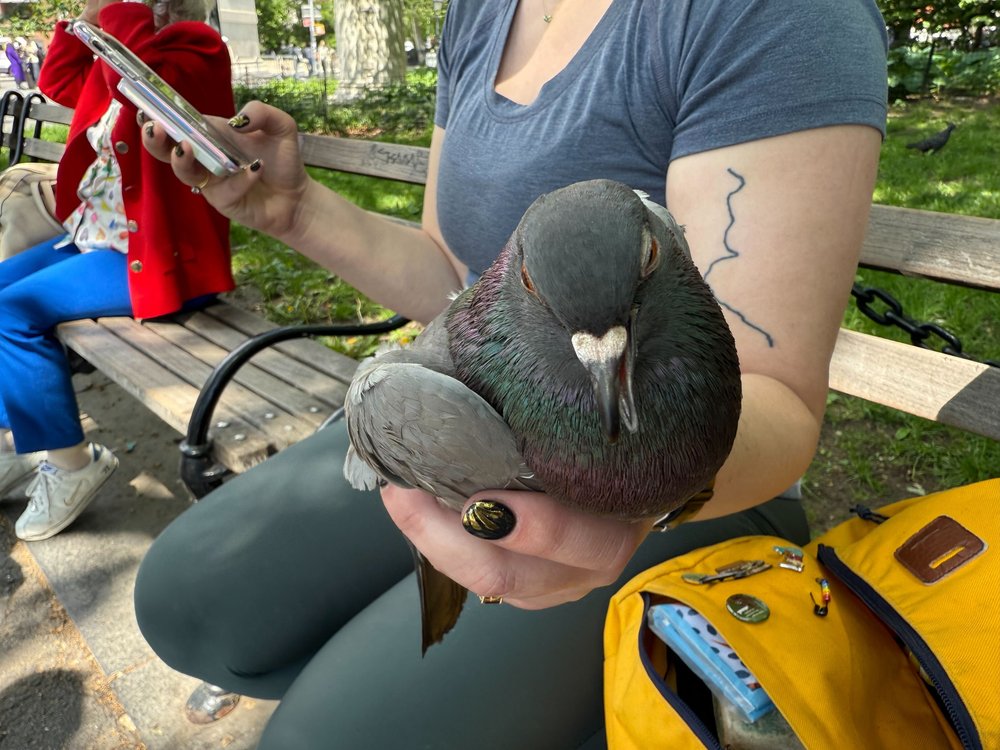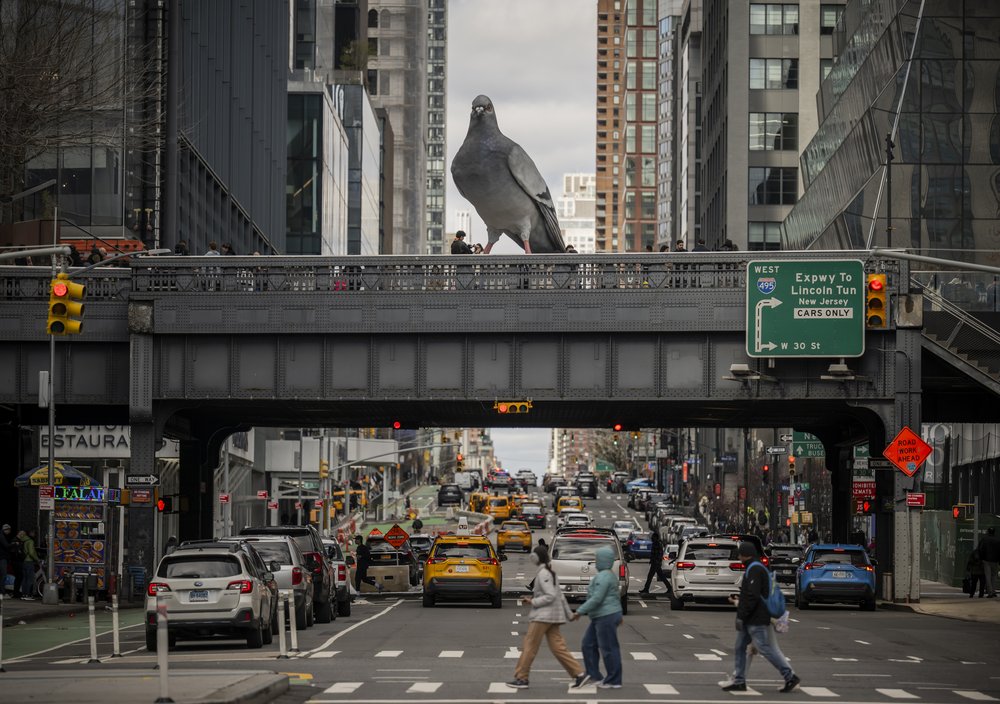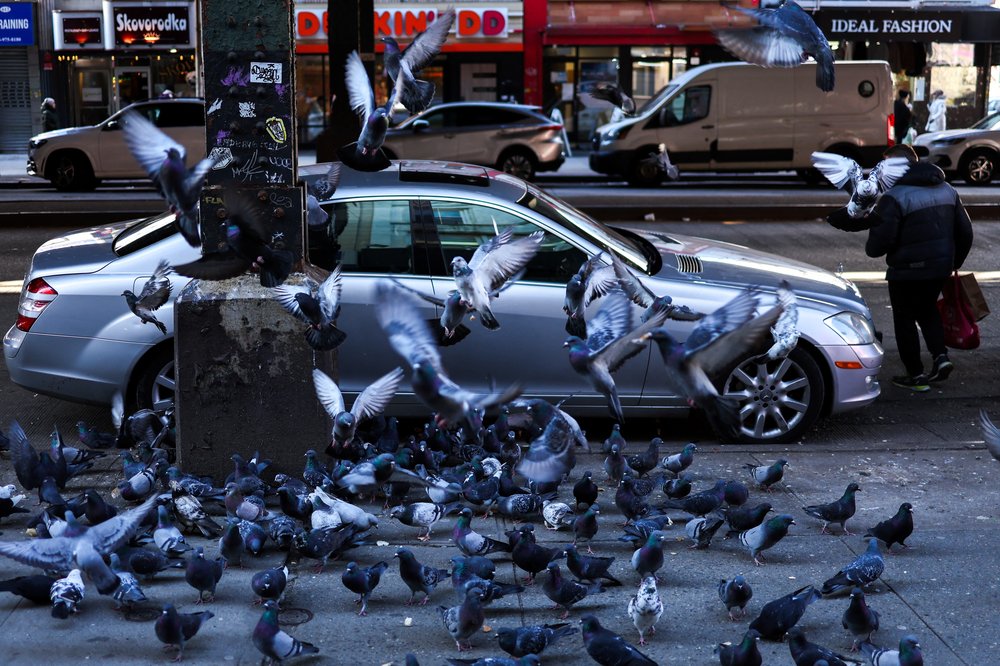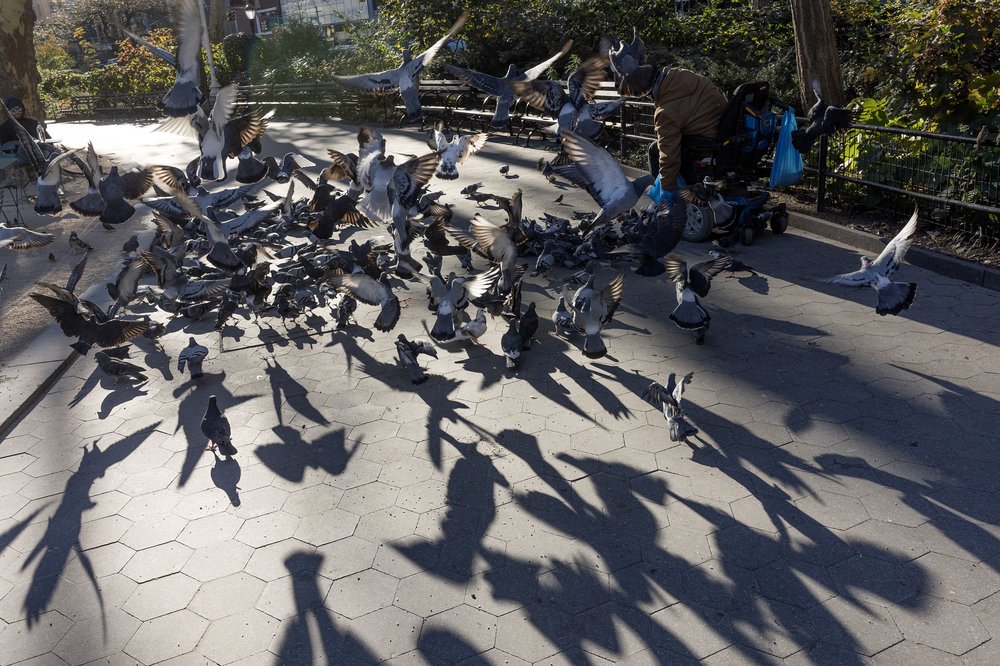NYC has pigeon people, and people who poo-poo pigeons: Understanding 'rats with wings'
May 9, 2025, 6:31 a.m.
It's a busy time for everyone's favorite avian companions.

It’s spring in New York City and pigeons are in the air. And on sidewalks, in parks, and on statues, buildings and benches.
It's pigeon breeding season, and the birds are more active as they look for mates. So are the New Yorkers who — helpfully or harmfully — feed them by spreading corn, peas or other goodies around while they enjoy the warm weather.
Pigeons are as iconic to New York as pizza and taxi cabs — but much more controversial. To many, they’re a nuisance — “rats with wings.”
The pigeon-particular ornithophobiacs (that’s a big word for people who fear or hate birds) noted that pigeons cover the city with droppings and fear they carry disease.
Yet pigeon lovers, who are fewer in number but make up for it in passion, see the birds as beautiful, intelligent creatures that are unfairly outcast from society.
Pigeons loom large over the High Line and among the concerns of people who’ve reported flocks are disappearing at the hands of netters who sell them for profit. But there’s a lot people don’t quite understand about our oh-so-common Columbidae.
Why are there so many pigeons in New York?
Pigeons aren’t native to New York, or even North America. Colin Jerolmack, a professor of sociology and environmental studies at NYU, wrote a book about pigeons. He said city pigeons are actually rock doves native to North Africa and the Mediterranean, where they live on cliffsides.
It’s believed that they were the first domesticated birds, potentially as far back as 10,000 years ago. They were not only used for food, but also their poop, which is a valuable fertilizer. And because of their ability to return home from hundreds of miles away, they served as messengers.
Jerolmack said it’s believed that French settlers brought them to North America in the 1600s as a food source.
“What that means is since they've been living around people for so long and people have bred them, the pigeons we have are sort of feral. They're the descendants of escaped domesticated pigeons,” he said. “We bred them and made them well adapted to living with people, to living in all different kinds of environments and being quite hardy, and then now they're still there even though we don't want them there anymore.”
Why so much tension between NYC’s pigeon lovers and haters?
In New York’s residential neighborhoods and parks, pigeon lovers feed the birds as part of their daily routines. They have different reasons for doing so.
Some see it as a way to connect with nature, while others feel it’s their purpose to take care of the stigmatized birds.
Rena Schilsky feeds several flocks in Manhattan every day, and carries print-outs of “surprising facts about pigeons” to share with people.
“They're actually very nice birds and very intelligent birds, very homeless birds,” she said.
But because pigeons are trainable and habitual birds, flocks will settle in areas where they're fed regularly.
Not everyone takes kindly to habits like Schilsky’s.
She showed Gothamist a “wanted poster” neighbors made, with her picture.
“This woman is feeding pigeons in our neighborhood and bringing disease from their dropping and rats!” the poster warns. “Tell her to stop!”

Carol Zalben lives on 14th Street in Manhattan. She said the scaffolding attached to her building had become a “pigeon hotel” after another woman fed pigeons there daily for months.
“That was when you would be walking under the scaffolding, you’d have to pick your way,” she said. “I wish I had taken videos of the flocks winging, just like circling around it was so — I mean it was like a bad movie, honestly.”
Zalben said she had several concerns about what she described as a “pigeon plague” — from disease (we’ll get back to the health concerns in a little bit), especially with bird flu making headlines, but also with droppings damaging the building. She also worried the food meant for the pigeons would attract rats.
After the scaffolding came down earlier this year, Zalben said, the birds took over the building’s garage, where they awaited their daily feeding and sometimes flew at people’s car windows.
She said complaining to the city has not been fruitful. In her frustration, she wrote a petition to her local elected officials that received more than 100 signatures — but got no response.
Is feeding pigeons legal?
Feeding pigeons in New York is legal, though those who feed them are responsible for the resulting mess and could receive citations if they don’t clean up the droppings. But those rules are rarely enforced.
The city’s parks department tries to discourage pigeon feeding. In an email, a spokesperson told Gothamist feeding pigeons can be problematic because it will attract other wildlife. Healthy wild animals can feed themselves, but can lose their hunting and foraging instincts if they become dependent on handouts, the spokesperson said.
The health department also advised against feeding pigeons for similar reasons, and added that it can be unhealthy for the birds themselves.
But feeders disagreed.
Schilsky said she only feeds pigeons grain, which they eat during the day and doesn't leave anything behind for rats, which eat at night anyway.

What can you do if you have a pigeon problem?
Property owners can be fined for excessive droppings, so some New Yorkers might want to protect their buildings from pigeons. That’s where a pigeon pest control expert comes in.
Joshua Bloom, vice president of Standard Pest Management in Long Island City, said calls tend to spike in the spring, with people complaining about pigeon waste and noise.
“We definitely see more activity with pigeons in the warmer months, especially when they're nesting and raising young. That's when people definitely start having more activity on their balconies. Windowsills under their AC units,” he said.
Bloom said the company has several ways to mitigate the issue, starting with removing the pigeon waste and empty nests and sanitizing the area. Then, they add physical deterrents such as posts, wire systems and spikes, as well as multisensory deterrents.
Do pigeons actually pose health concerns for people?
Whenever people list their concerns about pigeons, disease — and lately, bird flu in particular — is bound to come up. But experts, including the city’s health department, say contracting such diseases from pigeons is extremely rare.
The health department told Gothamist that bird flu is primarily carried by water birds, which can infect poultry though their feces. Pigeons simply don’t become sick enough to spread the virus to other people or animals, according to the department.
“Pigeons are birds and we are mammals, and so the likelihood of a zoonotic disease jumping from a bird to a mammal is really low,” said Elizabeth Carlen, an expert in pigeons in urban areas.

Carlen said if pigeon feces builds up on an AC unit, and then the air blows into someone’s apartment, it could affect the lungs of someone who is immunocompromised. But for healthy adults interacting with pigeons in the city, there is little cause for concern.
That said, the idea that they could harm people’s health could cause stress — and stress can harm health..
“It can make you kind of freaked out about where you're living — the cooing can kind of keep you up,” Carlen said.” I've had friends who had them living in their light wells and they would get very annoyed by the cooing of the pigeons, and that's totally fair.”
She said she understands that living close to animals can cause people some anxiety.
“I think there's also this kind of idea that cities are for humans, and not for animals,” she said. “And that's a very unfair assumption.”
This 16-foot pigeon coming to NYC might make you love pigeons Pigeons are everywhere in NYC. In Albany, they have the run of the State Capitol. What To Do When A Pigeon Lays An Egg On Your Bed (Yes, It's Known To Happen)